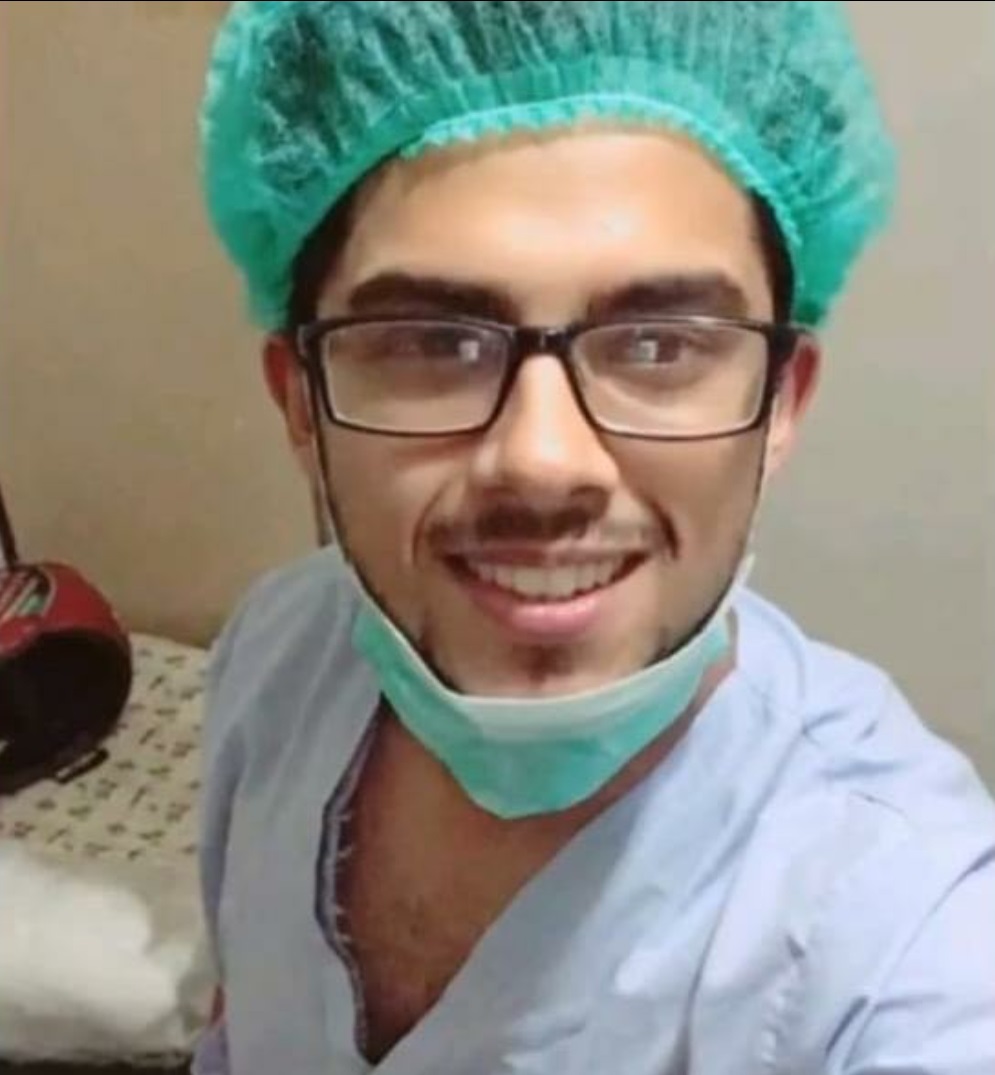15 June 2020 – “When my son was in his hospital bed, and they were giving him medicine, he’d say, ‘Mama, the mechanism of action of this drug is this, these are the side-effects.’” Dr Shabnam Tahir’s son, Salman, was a medical student preparing to become an anaesthesiologist when COVID-19 started spreading in Pakistan.
 Salman Tahir, a 21-year-old medical student studying anaesthesiology, observed a caesarean section earlier in 2020“His memory was remarkable. He knew every drug.”
Salman Tahir, a 21-year-old medical student studying anaesthesiology, observed a caesarean section earlier in 2020“His memory was remarkable. He knew every drug.”
“He wasn’t afraid of his disease,” says his mother. “He said, ‘Mama, don’t worry, I will come back after the ICU. Don’t cry, I will come back after 2 days."
Just a few days earlier, Salman had been at home with his family in Lahore — bored, like many young people in lockdown, but following protocols. “He was a healthy boy of 21. He never had ANY risk factor in his life,” says his mother. She and her husband, also a doctor, had been trained to protect themselves from infection. So as the number of COVID-19 cases increased, “we were strictly following the rules,” she says of the whole family.
With years of medical experience between them, the 2 parents watched their son’s initial symptoms at home carefully. At first, “he had headache, fever, and pain in his neck,” says his mother. They brought him to a hospital. “I thought, even if it’s meningitis — I’m a doctor, there are so many people with meningitis and they don’t die.”
But Salman deteriorated rapidly. “It was SO sudden,” says his mother. “I was with my child and I saw the progression of a disease.” Salman was first diagnosed with meningitis, and later his test for COVID-19 — confirmed via a method called PCR — came back positive.
Still, Salman was mentally alert. “He was looking quite normal, discussing his plans about his future. He remembered cell numbers, he asked me to call one of his friends, he told me the number,” says Dr Tahir. Meanwhile, she watched in alarm as his heart rate rose and the oxygen in his blood dropped, despite oxygen treatment.
“It was like a fire burning down everything in its way. It involved every organ in my son’s body.” His mother watched his symptoms — like swollen eyes — closely, more and more concerned. “His chest X-rays confirmed COVID-19 infection. He was so sick.” The hospital decided to move him into the ICU — for a short time, he thought.
But the disease was too fast and too severe. “It took only 72 hours from a healthy young man to a dead person,” says his mother.
A plea on behalf of health workers—and their families
“My message is this is a new disease, you don’t know what it will do. There may be SO many presentations,” says Salman’s mother. “Young people are less affected, but do not think it's an old-age disease.
“Don't think that if anybody does not have any risk factor, he/she cannot be affected with this virus.”
After their son’s test, the rest of the family was screened for COVID-19. “Mine was negative but my husband's screening was positive. This means my husband was an asymptomatic carrier,” she says.
On behalf of health workers worldwide, Dr Tahir begs all people to do their best to prevent the spread of COVID-19. “The only thing that can help is if EVERY person takes precautions, washing their hands again and again, social distancing, using masks in public places,” she says. “The doctor community is at too much risk. In spite of all precautions, we can bring this disease home to our dear ones.”
“For those who say that they are completely healthy and don't have any symptoms and they don't need to be isolated in quarantine centers, I want to tell them all that my husband is asymptomatic.
“He has been locked in a room since my son died. We are talking on the phone,” she says. “We place the food outside his room. Even after our son's death, we cannot even cry together.”
Dr Tahir’s plea comes at a time when many countries are relaxing their COVID-19 restrictions, and some people may be letting their guard down.
“WHO staff have watched, with breaking hearts, the sufferings of our health worker colleagues in the field as they battle COVID-19,” says Dr Palitha Mahipala, WHO Representative in Pakistan. “WHO has provided protective gear and training to protect health workers. We all have to keep trying and not relax our efforts. Only this way can we prevent tragedies.” WHO extended collaboration to the special programme “WE CARE,” launched by the government of Pakistan to protect health care workers, and supports the government’s efforts.
“Health workers are not only risking their own lives to treat COVID-19 patients, they are putting their families at risk,” Dr Mahipala continues.
For their part, Salman’s parents intend to continue their work as doctors. “We will continue to see patients, so our request to you is—please, please be careful,” says Dr Tahir. “EVERYONE has to take precautions. It’s the responsibility of EVERY individual. Don’t harm people and don’t be harmed by others.”
Related link
Pakistan runs "We care" campaign to protect frontline health care workers








